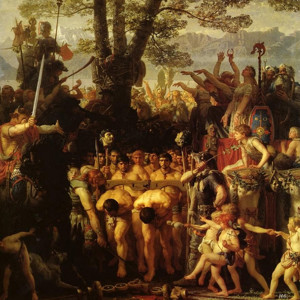Pass Under The Yoke

A crop from an 1858 painting entitled “The Romans Passing Underneath the Yoke”
A yoke is the harness that gets put across the backs of horses or oxen so they can pull a wagon or plow. As a symbol, it’s representative of work or subservience. A horse is “broken” when it will accept the yoke without fighting.
In ancient times, when an army would win a battle, they sometimes set up a ceremonial “yoke” – for example, they might erect spears so that one is horizontal, just under head height. They would then march the defeated army under the “yoke” so they would have to bow their heads in defeat to fit under it. It was considered the ultimate humiliation for a soldier.
The phrase is sometimes even further symbolic. To say someone “passed under the yoke” or is “beneath the yoke” might generally mean they were defeated, disgraced, humbled, or disciplined.
Why I Looked It Up
In The First Man in Rome several characters talk of “passing under the yoke” like it’s the end of the world.
There is a glossary at the end of the novel. It says:
To [pass beneath the yoke] was an intolerable humiliation; so much so that the Senate usually preferred to see a Roman army stand and fight until the last man was dead, rather than sacrifice Roman honor and dignity by surrendering and passing beneath the yoke.